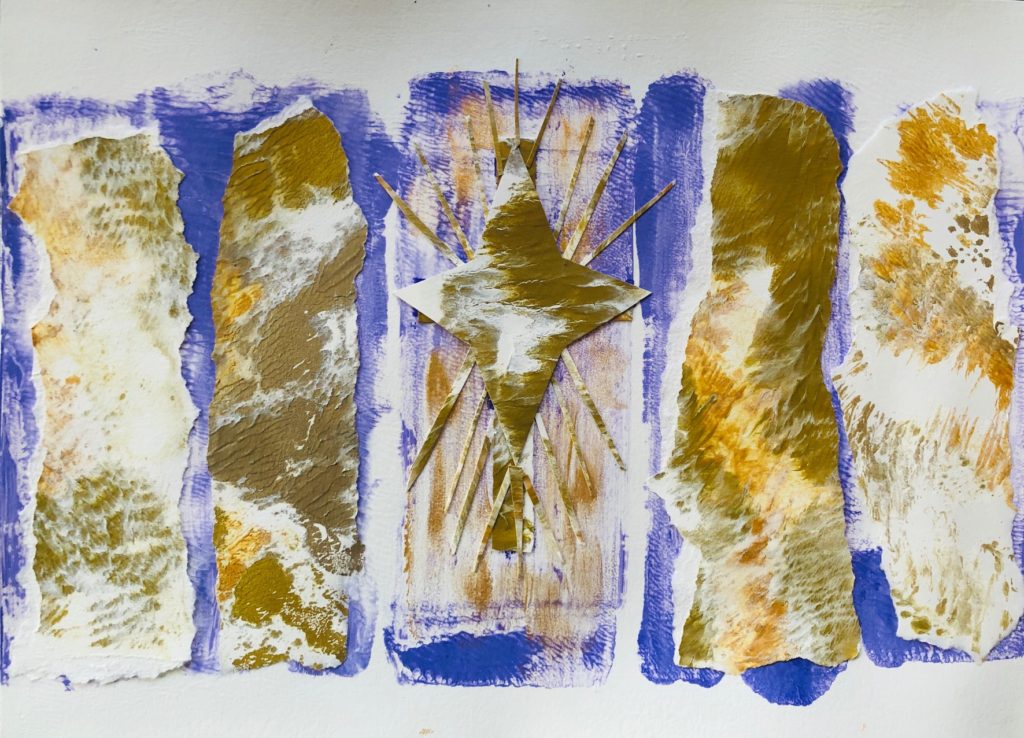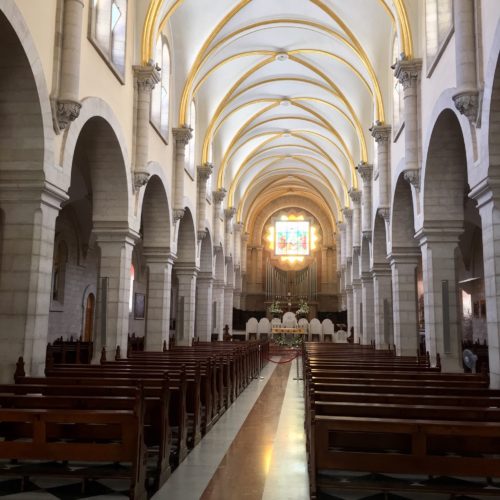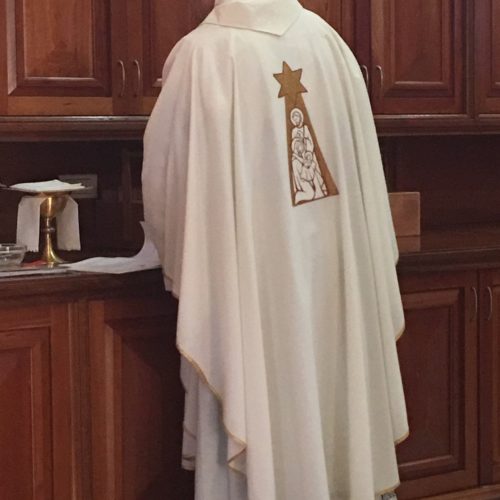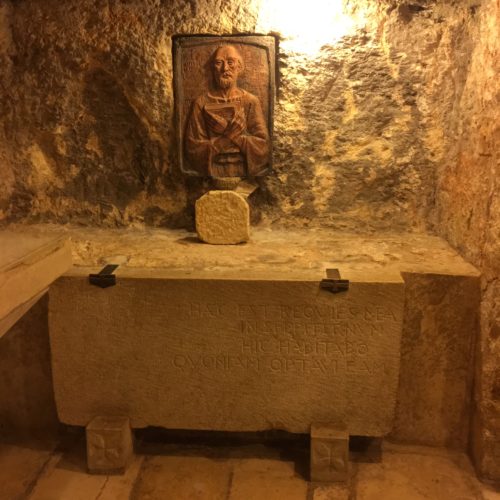“For today in the city of David a savior has been born for you who is Messiah and Lord.”
Source: USCCB.org (Luke 2:11)

“The time has come for Mary to give birth. Far from home, Joseph and Mary find shelter in a stable in Bethlehem. In the darkness of night, Jesus is born. As shepherds guard their flocks in fields nearby, an angel appears in the sky, announcing the Savior’s birth. Suddenly, the sky is filled with angels, praising and giving glory to God.”
Source: Magnifikid! Prayers for Schools Page 259
For Parents To Teach To Their Children
Our next class I will teach my students the story of the Nativity of Jesus, even though it’s not yet December. I wanted to help the Children know the story of the Nativity early because the class is beginning to focus on the preparation for First Reconciliation in December. A double dose of Christmas will be just right!
The “Joyful Mysteries” begin with the “The Annunciation,” “The Visitation,” and the “Nativity” which tell the story of the Mary, leading up to Mary finding Jesus in the Temple when he was about age 13. The Mysteries of the Rosary are our template for learning about the life of Jesus. Click to learn how to pray the Rosary: Catholic-Kids.com.
The Joyful Mysteries begin with The Annunciation and are “Said on Mondays and Saturdays, the Sundays of Advent, and Sundays from Epiphany until Lent.”
“The Joyful Mysteries”
- “The Annunciation
Mary learns that she has been chosen to be the mother of Jesus. - The Visitation
Mary visits Elizabeth, who tells her that she will always be remembered. - The Nativity
Jesus is born in a stable in Bethlehem. - The Presentation
Mary and Joseph take the infant Jesus to the Temple to present him to God. - The Finding of Jesus in the Temple
Jesus is found in the Temple discussing his faith with the teachers.”
Source: LoyolaPress.com “Mysteries of the Rosary”
Our Art Gallery
“Advent Wreath”… “Star of Bethlehem”… “The Nativity of Jesus”
Source: USCCB.org
A Reading for the Family, “The Nativity of our Lord Jesus Christ”
“This text, The Nativity of our Lord Jesus Christ, may be chanted or recited, most appropriately on December 24, during the celebration of the Liturgy of the Hours. It may also be chanted or recited before the beginning of Christmas Mass during the Night. It may not replace any part of the Mass. (The musical notation is found in Appendix I of the Roman Missal, Third Edition.)”
Source: USCCB.org
“The Twenty-fifth Day of December,
when ages beyond number had run their course
from the creation of the world,
when God in the beginning created heaven and earth,
and formed man in his own likeness;
when century upon century had passed
since the Almighty set his bow in the clouds after the Great Flood,
as a sign of covenant and peace;
in the twenty-first century since Abraham, our father in faith,
came out of Ur of the Chaldees;
in the thirteenth century since the People of Israel were led by Moses
in the Exodus from Egypt;
around the thousandth year since David was anointed King;
in the sixty-fifth week of the prophecy of Daniel;
in the one hundred and ninety-fourth Olympiad;
in the year seven hundred and fifty-two
since the foundation of the City of Rome;
in the forty-second year of the reign of Caesar Octavian Augustus,
the whole world being at peace,
JESUS CHRIST, Eternal God and Son of the eternal Father,
desiring to consecrate the world by his most loving presence,
was conceived by the Holy Spirit,
and when nine months had passed since his conception,
was born of the Virgin Mary in Bethlehem of Judah,
and was made man:
The Nativity of Our Lord Jesus Christ according to the flesh.”
Source: USCCB.org “The Nativity Of Our Lord Jesus Christ From The Roman Martyrology”
Praying the Rosary

Please read the Apostles’ Creed out loud with your children. Read it slowly, line for line, explaining the meaning and significance of the lines to your children. It explains what we believe in as Catholics. If possible, read this daily to help your children memorize the prayer.
“The Apostles’ Creed” is a profession of our faith and is a prayer. It states the basic beliefs of the Catholic Church. 
Our Prayers
“Anima Christi”
“Soul of Christ, sanctify me.
Body of Christ, save me.
Blood of Christ, purify me.
Passion of Christ, strengthen me.
O good Jesus, hear me.
Suffer me not to be separated from you.
From the malicious enemy, defend me.
In the hour of my death call me
and bid me come unto you,
that with your saints I may praise you
for ever and ever. Amen.”
Page 80
“Short Prayers”
“Jesus, gentle and meek of heart,
make my heart like yours.”
“O Mary, conceived without sin,
pray for us who have recourse to you.”
“O God, create in me a pure heart.
My God, come to my aid,”
make haste to help me.”
Page 86
Source: A Missal for Children

My Bethlehem Experience
“The Church of the Nativity marks the birthplace of Jesus in Bethlehem. It enshrines the Grotto – the Manger in which it is believed Jesus Christ was born.” Jerusalem.Com
In June, 2017, I visited the Nativity Church and the Manger Grotto in Bethlehem. My son, Father William Goldin, was my guide. He celebrated Mass, with me as the lector, in the Manger Grotto, and we were joined by two nuns. One nun was from Aleppo in Syria and the other was a Christian Palestinian from Bethlehem. I was quite surprised to realize that Jesus was actually born in a cave. Our taxi driver told us that for many centuries before and after Jesus was born, people in this region lived in caves. It is a rough, desert area and the town of Bethlehem is ancient, built upon a ridge. It was confusing to think about the images of Mary and Baby Jesus in a lovely stable with straw in the wooden manger. In fact, the manger, which is a trough that holds the food for the sheep and other livestock, was actually a cold hewn-rock vessel. In Western tradition, the rock cave has changed over two thousand years to become a European-style wooden barn, cosy with straw and familiar farm animals. This is not a malicious deception. It is how stories change over time and how cultures add their own knowledge of the world to these stories. I was surprised to see the ruggedness of the cave Jesus was most likely to have been born in. These were harsh living conditions. However, I recently learned that the average year-round temperature of a cave in Bethlehem is about 69 degrees. What a great relief that must have been for the Holy Family from the cold winter weather.
The caves of this region provided shelter and safety for thousands of years to the inhabitants of this region. We must understand that people adapt to the landscape they live in. Some people in Bethlehem still live in caves, today.
Everything we saw and visited helped me understand how strong, brave, and indomitable the Holy Family was.
A Traditional Nativity Song
O little town of Bethlehem
1 O little town of Bethlehem,
how still we see thee lie!
Above thy deep and dreamless sleep
the silent stars go by.
Yet in thy dark streets shineth
the everlasting Light;
the hopes and fears of all the years
are met in thee tonight.
2 For Christ is born of Mary,
and gathered all above,
while mortals sleep, the angels keep
their watch of wondering love.
O morning stars, together
proclaim the holy birth,
and praises sing to God the King,
and peace to all on earth.
3 How silently, how silently
the wondrous gift is given!
So God imparts to human hearts
the blessings of his heaven.
No ear may hear his coming,
but in this world of sin,
where meek souls will receive him still
the dear Christ enters in.
4 O holy Child of Bethlehem,
descend to us, we pray.
Cast out our sin and enter in;
be born in us today.
We hear the Christmas angels
the great glad tidings tell;
O come to us, abide with us,
our Lord Emmanuel.
To Hear the Tune:
Our Writing Project
A “Thank You” Note to Mary
We all owe a huge “Thank You” to Mary.
She said “Yes!” to God when the angel, Gabriel, gave her the message that she was to have a Son and was to call Him “Jesus.”
Mary bravely walked to Ein Karem from Nazareth, an eighty-plus mile, rocky and rough journey to help her much older cousin, Elizabeth, and to share the good news to her own baby. Of course, Elizabeth already knew that Mary was carrying her “Lord!” God had told her so.
She again was brave and strong, when she and her husband, Joseph, had to travel to Bethlehem for the census. Mary rode on the back of a small donkey, while preparing to deliver her baby.
Imagine how tired she must have been by the time the inn keeper rejected the expectant couple. That is a message for all of us–“Treat others as you wish to be treated!”
Mary delivered the precious Son, with Joseph, in a rock-hewn stable for animals. Cold and dark, the Holy Family kept their baby warm and fed.
The Angels announced His birth to humble shepherds, who came to pay Baby Jesus homage. Three kings followed a bright star to find the precious baby who was born the Messiah.
Mary had a profound and awesome job–raising the Son of God, Wholly Human and Wholly Divine–keeping him safe and protected from terrible threats and powerful enemies!
Invite your child to write a “Thank You” note to Mary. Provide paper (folded into a note or full size), writing tools (markers, Sharpie pens, colored pencils, etc.), lovely stickers and a glue stick. When the watercolor painting below is dry, glue the letter to Mary to the back as a Nativity memento. Younger children might write, “I love you, Mary.” or another simple sentence of gratitude and love.

Our Art Project #1–Simple Angels In The Sky

Our Art Project #2– A Watercolor Of The Sky Over Bethlehem
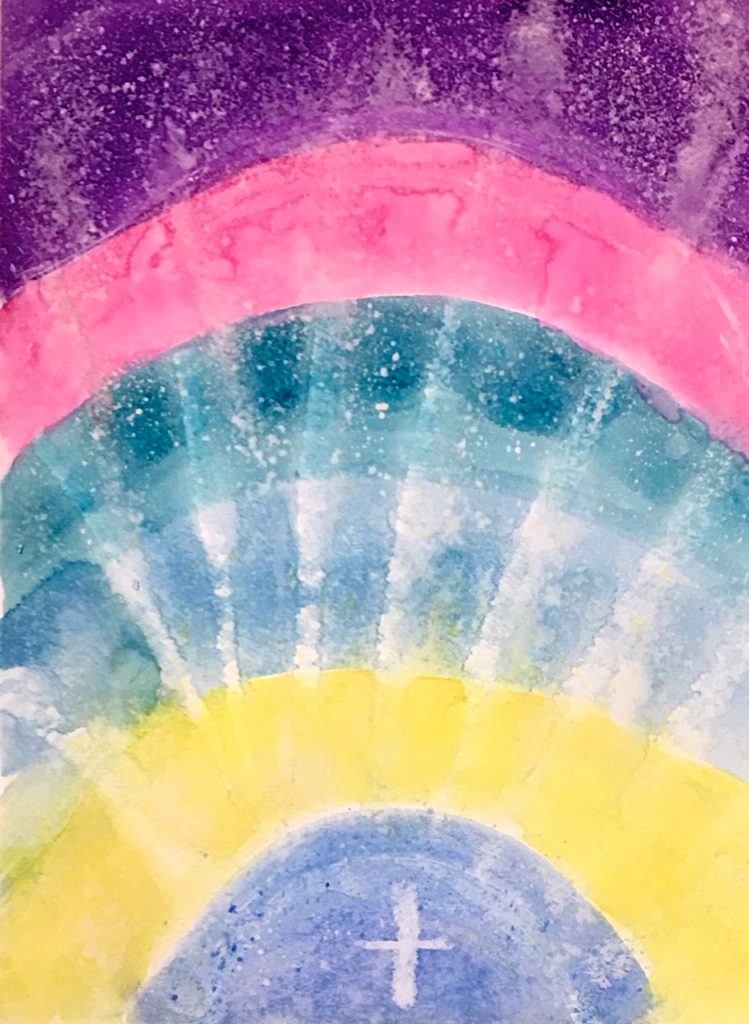
The Sky Above Bethlehem on The Nativity
This watercolor was done using a water soluble pastel crayon to make the arches, rays and cross. I painted over the marks with dry cake-style watercolors, using lots of water to get good color saturation. When it dried, I used a tooth brush rubbed into white watercolor with less water than normal, to create splatter on the painting to mimic stars. Shake off excess water before splattering. If a big drop lands somewhere, simply blot up with a paper towel. Watercolors are very forgiving when it comes to “mistakes!”




